Number of ChatGPT Users and Key Stats (December 2024)

Dave Ver Meer · Updated: December 1, 2024
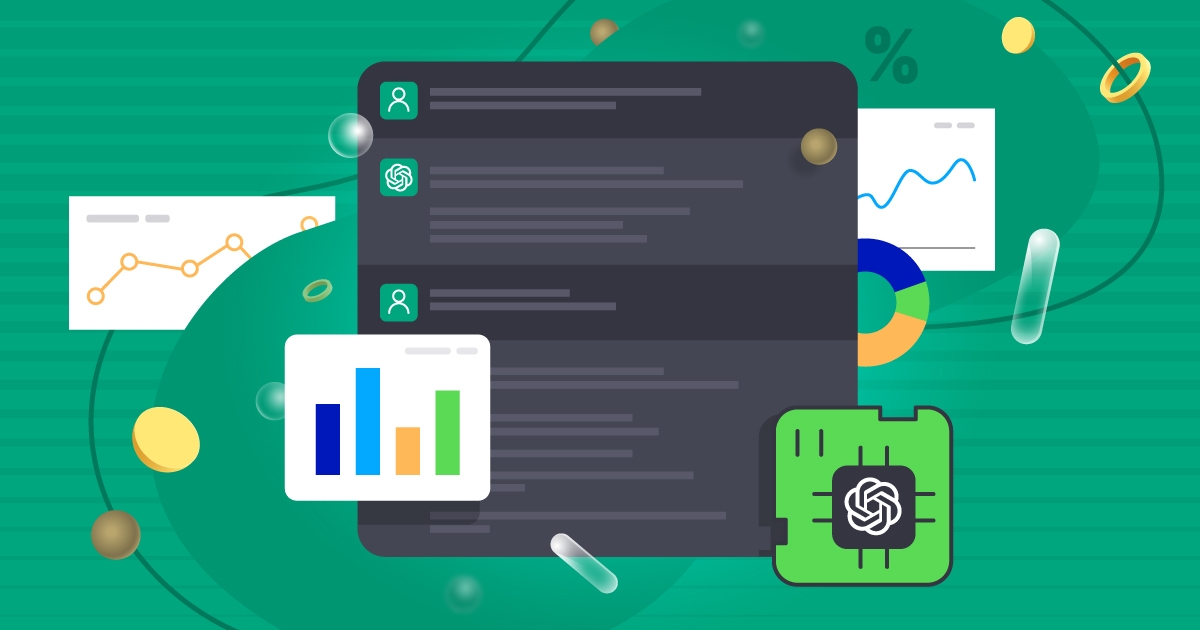
OpenAI’s ChatGPT has forever altered the direction of technology and how we work.
With the release of o1, the first in a series of "reasoning" models that Open AI is planning, ChatGPT can now write better code, solve multi-step problems, and answer more complex questions.
ChatGPT currently has over 180.5 million users, which is up 80% from the 100 million it had in January of 2023.
In this up-to-date article, we’ll explore all the latest statistics you’d want to know about, including the current number of users, details from recent studies, growth, and estimated revenue.
Let’s dive into the stats.
ChatGPT has over 180.5 million users
Its user count grew from 100 million in January 2023 to over 180.5 million currently.
The ChatGPT website received 3.66 billion website visitors in October, which is an increase of 17% from September.
Top ChatGPT stats
-
According to the latest data, ChatGPT has over 180.5 million monthly users.
-
ChatGPT has 100 million weekly active users.
-
Daily traffic to ChatGPT topped 100 million visits following the GPT-4o announcement.
-
Between iOS and Android, the ChatGPT app has been downloaded over 110 million times and made nearly $30 million for OpenAI.
-
ChatGPT launched in November 2022 and took just 5 days to add 1 million users.
-
It costs an estimated $700,000 per day to run and operate ChatGPT, with the cost per query being around $0.36 cents.
-
According to Sam Altman, OpenAI has more than doubled its annualized revenue to $3.4 billion in the past six months.
-
OpenAI has a valuation of $157 billion, based on their latest fund-raising round, which was led by Thrive Capital.
-
Over 92% of Fortune 500 companies are using OpenAI's platform, and over 2 million developers are using its APIs.
Sources: Reuters1, TechCrunch1, SemiAnalysis, Reuters2, Ars Technica, Forbes1, TechCrunch3, CNET, Similarweb, The Information, Forbes2
How many users does ChatGPT have?
ChatGPT has over 180.5 million users. It took ChatGPT just 5 days to add 1 million to its user base after launching. The ChatGPT website currently gets 3.66 billion visitors a month.
For some perspective, it took Facebook 10 months to reach 1 million users. Netflix took the longest of all, taking around 3.5 years to get to 1 million users.
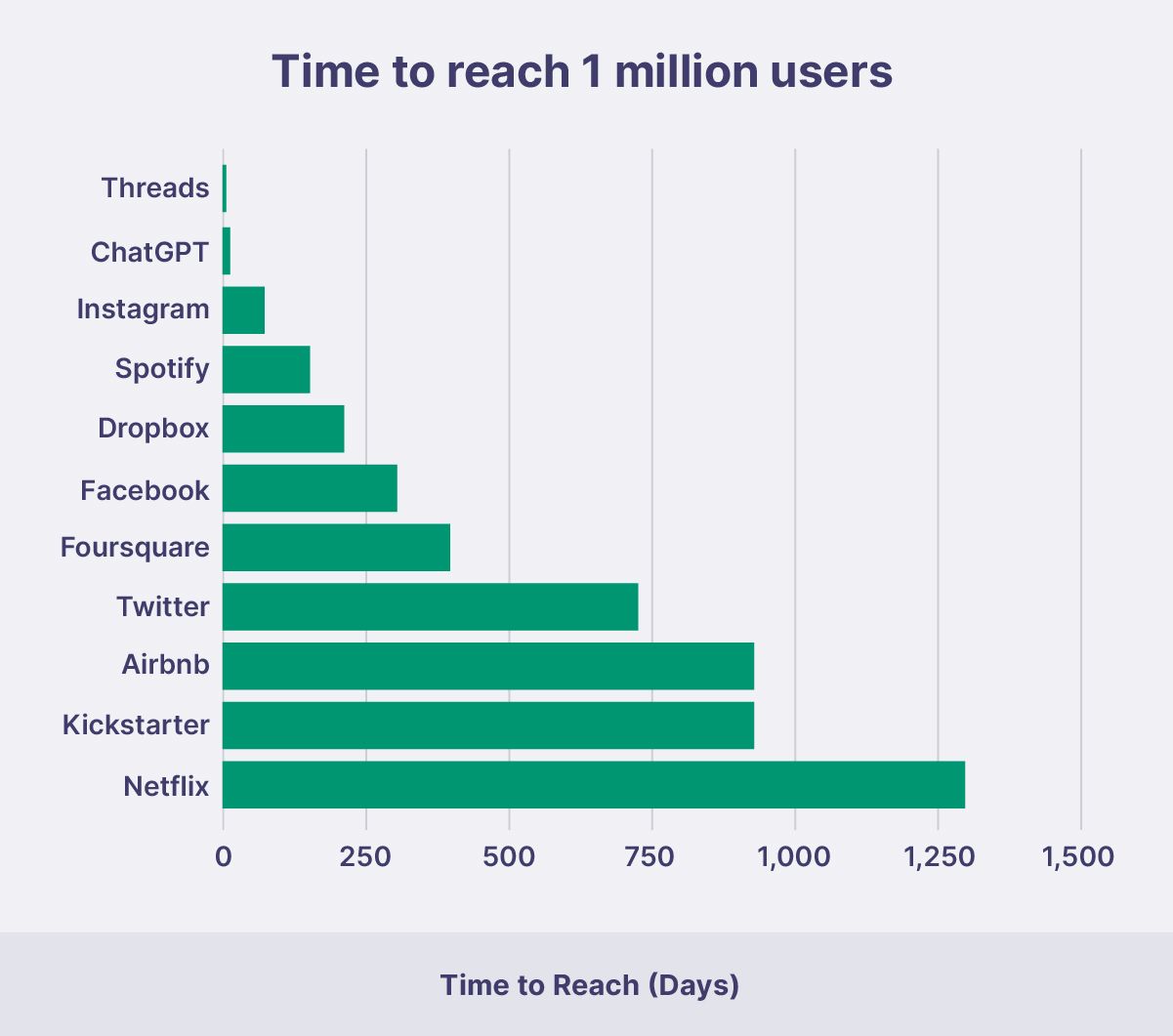
Here are the exact numbers for how long it took different companies to reach the 1 million user mark.
| Company | Year Launched | Time to Reach 1 Million Users |
|---|---|---|
| Threads | 2023 | Less than 2 hours |
| ChatGPT | 2022 | 5 days |
| Instagram*** | 2010 | 2.5 months |
| Spotify | 2008 | 5 months |
| Dropbox | 2008 | 7 months |
| 2004 | 10 months | |
| Foursquare*** | 2009 | 13 months |
| 2006 | 2 years | |
| Airbnb** | 2008 | 2.5 years |
| Kickstarter* | 2009 | 2.5 years |
| Netflix | 1999 | 3.5 years |
*1 million backers **1 million nights booked ***1 million downloads
Source: Statista
Overview
| Parent Company | OpenAI |
|---|---|
| Headquarters | Pioneer Building, San Francisco, California |
| Founders | Sam Altman, Elon Musk, Carlos Virella, Greg Brockman, Ilya Sutskever, John Schulman, and Wojciech Zaremba |
| CEO | Sam Altman (Current). Mira Murati and Emmett Shear were each CEO briefly |
| Owned By | OpenAI owns and develops ChatGPT |
| Funded By | Microsoft is OpenAI’s largest investor. Other notable investors include Khosla Ventures, Thrive Capital, and Infosys |
| Release Date | The initial launch of ChatGPT was on November 30, 2022. GPT-4 (March 13, 2023). GPT-4 Turbo (November 6, 2023). GPT-4o (May 13, 2024). GPT-4o mini (July 18, 2024). o1 and o1-mini (September 12, 2024) |
| Number of Users | 180.5 million |
| Weekly Active Users | 100 million |
| Website Traffic | 3.66 billion |
| Versions | Versions since the initial launch are GPT 3.5 (free), GPT-4, GPT-4 Turbo (premium), GPT-4o (free/premium), and o1 (premium) |
| Training Data Size | 570GB (300 billion words) |
| Model Parameters | 175 billion (GPT-3), 1.7 trillion (GPT-4, estimated) |
| Current Knowledge Limit | The knowledge cutoff for GPT 3.5 and GPT-4 is September 2021. GPT-4 Turbo has a cutoff of April 2023 and GPT-4o has a cutoff of October 2023. |
| Cost to Run (Daily) | $700,000 per day (estimate) |
| Cost per Query | $0.36 cents (estimate) |
| Cost for Users | Basic version is free. $20/mo for ChatGPT Plus |
| Estimated Revenue | $200 million in 2023, $1.3 billion in 2024 |
| Valuation | $86 billion (current) |
ChatGPT user and usage stats
-
According to the Pew Research Center, 23% of U.S. adults say they've used ChatGPT, which is up from 18% in the previous survey.
-
According to the Pew Research Center, 23% of U.S. adults say they've used ChatGPT, which is up from 18% in the previous survey.
-
In a survey about ChatGPT usage, professionals in marketing had the highest adoption rate (77%), while insurance had the lowest (33%).
-
Among Americans, young adults (18-29) have the highest rate of ChatGPT use (43%), while just 6% of older adults (65+) use it.
-
A survey of business owners found that 44% plan to use ChatGPT to translate content to other languages, and one in three plan to use it for writing content.
-
Customer support agents at a Fortune 500 company were 14% more productive when they were able to use ChatGPT, with gains being even more significant for lower-performing agents.
-
A survey of business leaders revealed that 24% of U.S. companies saved $50,001-$75,000 by using ChatGPT. Combined, over half (66%) saved between $5,001-$75,000.
-
A medical research study found that ChatGPT writes medical notes 10 times faster than doctors without sacrificing quality.
-
Almost a third of U.S. travelers (32%) say they are likely to use ChatGPT to plan their next trip.
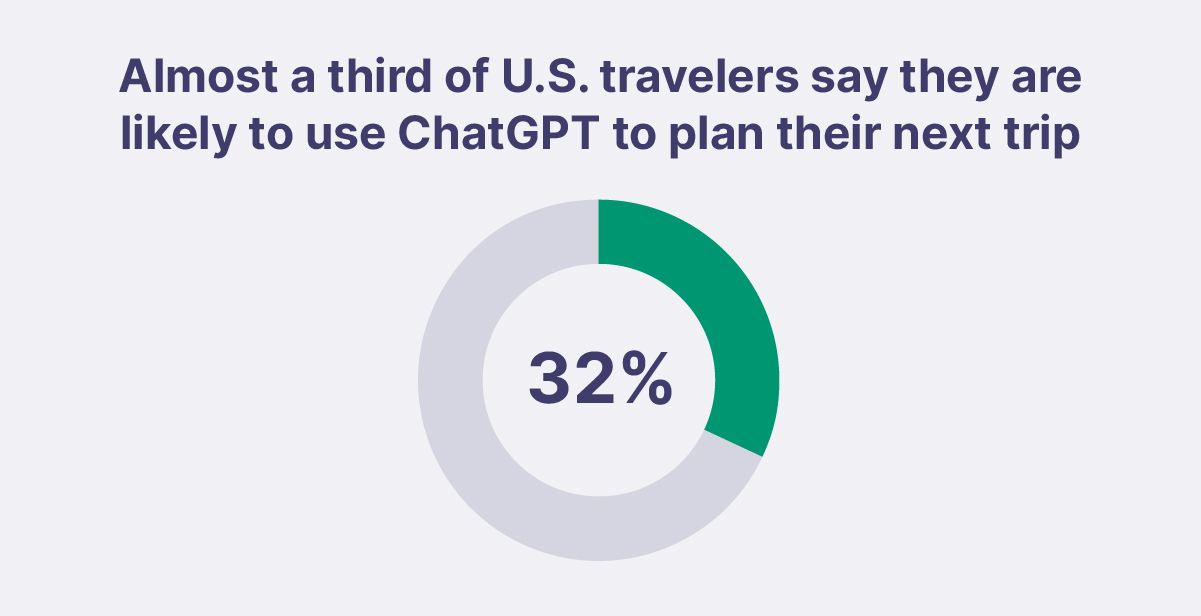
-
55.22% of visitors to OpenAI’s website are male and 44.78% are female. Those ranging in age from 25-34 years old (33.11%), make up the largest share of visitors.
-
57% of business owners believe that ChatGPT will increase traffic to their websites, and 47% think it will improve their credibility.
-
People have difficulty detecting whether they're chatting with GPT-4 or a real human, with GPT-4 being judged as human 54% of the time.
-
A survey of American professionals found that 32% worry about AI making some jobs disappear. Almost half (48%) think they could be left behind in their careers.
-
36% of Gen Z feels guilty about using ChatGPT to help them at work and 1 in 3 of them worry about becoming too dependent on it.
-
A study measuring divergent thinking and creativity found that GPT-4 gave more original and complex answers than human participants.
-
In a study with over 1,900 human participants, ChatGPT showed that it can mimic theory of mind by performing at or above human levels when identifying indirect requests, false beliefs, and misdirection.
-
97% of business owners believe that ChatGPT will help their business in some way.
-
A research study shows that the quality of ChatGPT responses can be improved up to 45% by being direct in prompts and offering a tip.
Sources: Forbes1, Gizmodo, CBS News, Similarweb, Longwoods International, Forbes2, OpenAI, HR News, Ars Technica, Arxiv, Axios, University of Arkansas, Forbes3, Pew Research Center, Medical XPress, HR Dive, Statista, Nature, arXiv
ChatGPT app stats
The ChatGPT iOS app racked up 697,000 downloads in the first 8 days following its release. Since then, the combined downloads on iOS and Android have reached over 110 million.
The U.S. has the highest share of ChatGPT downloads (18%), which gives it a slight lead over India (17.5%).
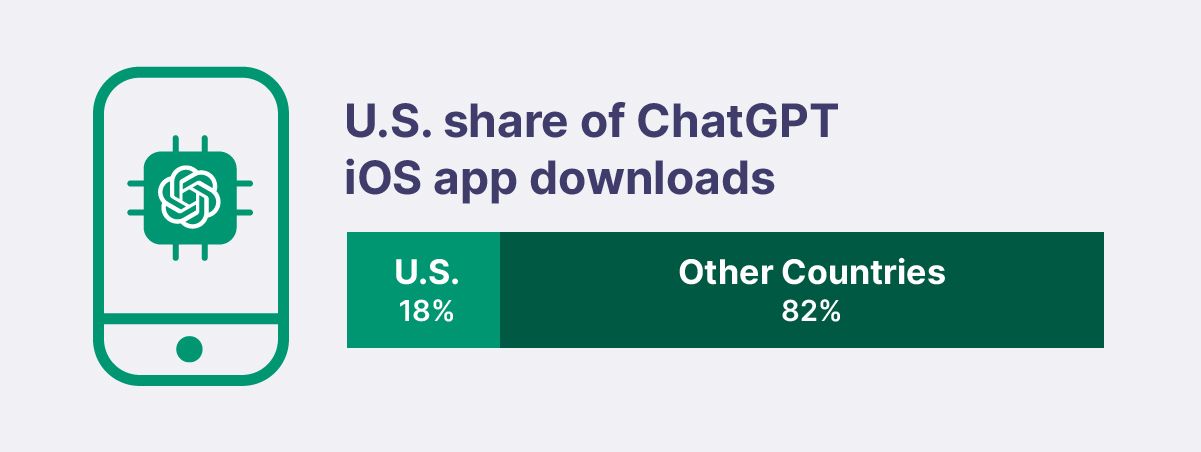
Global downloads of the app leveled out last summer and hit a peak of 20 million per month in November. Further, iOS and Android app downloads average a combined 4 million each week.
| Month | Worldwide ChatGPT App Downloads |
|---|---|
| May 2023 | 3.89 Million |
| June 2023 | 12.16 Million |
| July 2023 | 9.72 Million |
| August 2023 | 15.8 Million |
| September 2023 | 17.46 Million |
| October 2023 | 17.94 Million |
| November 2023 | 20.46 Million |
| December 2023 | 13.96 Million |
In February, almost one year after its release, the ChatGPT app had 3.25 million downloads in the U.S.
| Month | U.S. ChatGPT App Downloads |
|---|---|
| May 2023 | 1.68 Million |
| June 2023 | 2.46 Million |
| July 2023 | 2 Million |
| August 2023 | 2.2 Million |
| September 2023 | 2.54 Million |
| October 2023 | 2.8 Million |
| November 2023 | 3 Million |
| December 2023 | 3.27 Million |
| January 2024 | 3.18 Million |
| February 2024 | 3.25 Million |
Sources: Benzinga, Statista1, TechCrunch, Statista2
ChatGPT traffic and monthly visitor stats
The ChatGPT website had 3.66 billion visits in October.
-
Visitors to ChatGPT view an average of 3.66 pages per visit.
-
Each visitor spends an average of 6 minutes and 11 seconds on the website.
Social media traffic
62.07% of traffic is from YouTube, making it the largest source of ChatGPT’s social network traffic. Put another way, 6 in 10 visits are from YouTube.
Here’s a detailed breakdown of the other top social networks that send traffic.
| Rank | Social Network | Traffic Share |
|---|---|---|
| 1 | YouTube | 62.07% |
| 2 | 10.09% | |
| 3 | 8.92% | |
| 4 | 3.51% | |
| 5 | 2.72% |
Top marketing channels
Direct visits (71.84%) make up the vast majority of ChatGPT’s traffic. Organic search is the second largest source of traffic, making up 22.59%.
| Rank | Channel | Traffic Share |
|---|---|---|
| 1 | Direct | 71.84% |
| 2 | Organic Search | 22.59% |
| 3 | Referrals | 3.38% |
| 4 | Social | 2.02% |
| 5 | Display | 0.08% |
| 6 | 0.07% | |
| 7 | Paid Search | 0.02% |
Source: Similarweb
ChatGPT country stats
At 14.58%, the U.S. makes up the largest share of users visiting the ChatGPT website (chatgpt.com).
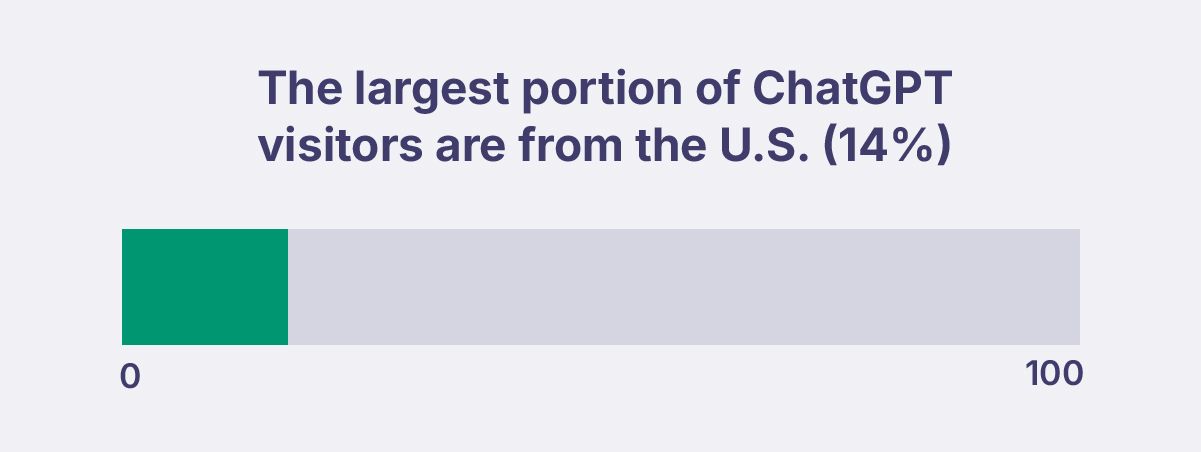
Second and third place go to India (9.37%) and Brazil (4.88%).
| Rank | Country | Traffic Share |
|---|---|---|
| 1 | U.S. | 14.58% |
| 2 | India | 9.37% |
| 3 | Brazil | 4.88% |
| 4 | Indonesia | 4.04% |
| 5 | U.K. | 3.77% |
Source: Similarweb
ChatGPT is currently banned in 6 countries:
- Russia
- China
- North Korea
- Cuba
- Iran
- Syria
ChatGPT demographic stats
The makeup of ChatGPT users is 45.34% female and 54.66% male. The largest age group is 25-34 year olds (31.18%), followed by 18-24 year olds (25.43%).
Combined, 18-34 year olds make up over half (56.61%) of the traffic.
| Age Range | User Share |
|---|---|
| 18-24 | 25.43% |
| 25-34 | 31.18% |
| 35-44 | 18.81% |
| 45-54 | 12.34% |
| 55-64 | 7.47% |
| 65+ | 4.77% |
Source: Similarweb
ChatGPT awareness stats
According to the Pew Research Center, 58% of U.S. adults have heard something about ChatGPT. Of those, 18% have heard a lot, 39% have heard some, and 42% have heard nothing.
Here's a detailed look at their findings:
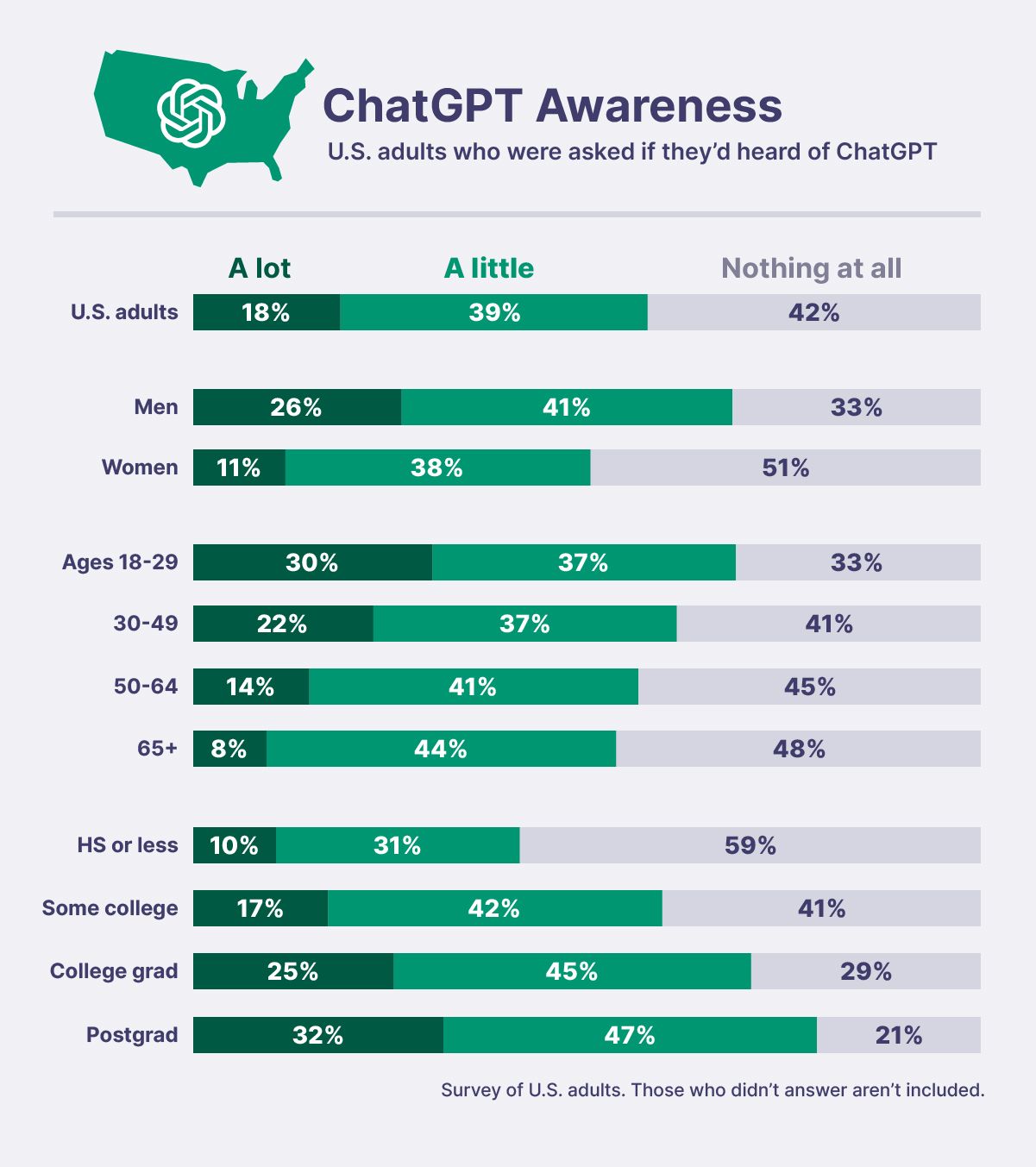
Source: Pew Research Center
ChatGPT education stats
-
In an exam for the International Mathematics Olympiad, GPT-4o correctly solved 13% of problems, while o1 was able to outperform it by solving 83%.
-
One in three American teachers , according to a recent survey.
-
According to a survey, 19% of U.S. teens ages 13-17 say they've used it for schoolwork. They also found that teens think it's okay to use it for: researching new topics (69%), solving math problems (39%), and writing essays (20%).
-
Over 40% of university students say they use ChatGPT for their coursework. 39% of prospective students say they wouldn’t consider going to a college that banned ChatGPT and other AI.
-
Half of college students (51%) believe that using AI tools like ChatGPT for coursework and exams is cheating.
-
26% of teachers caught their student cheating by using ChatGPT and 43% think it will make their jobs harder.
-
1 in 3 college students (30%) say they’ve used ChatGPT to complete written assignments.
-
GPT-4 took the bar exam and earned a score that puts it in the 90th percentile of test takers.
-
According to a recent study from Brigham Young University, ChatGPT flunked an accounting exam, scoring just 47.4%, while students had an average score of 76.7%.
-
GPT-4 took the Law School Admission Test (LSAT) and managed to score in the 88th percentile.
-
When GPT-4 took the SAT, it scored a 1410 on it, putting it in the 94th percentile. For comparison, the average score for the SAT is 1060.
Sources: Forbes, Study.com, Intelligent, Pew Research Center, ABA Journal, Business Insider, BYU, Open AI
ChatGPT healthcare stats
-
Research shows that ChatGPT can write medical notes up to 10 times faster than human doctors, without sacrificing quality.
-
ChatGPT can analyze medical charts, with one study finding that it was able to convert clinical notes to data with 89% accuracy.
-
In a match-up between ChatGPT and Bard, a study showed that Bard performed better, with 53.6% accuracy when answering medical questions, compared to ChatGPT (28.6%).
-
Researchers found that ChatGPT has an accuracy of 72% in overall clinical decision-making on textbook case studies.
-
A study found that ChatGPT incorrectly diagnosed more than 80% of pediatric case studies.
Sources: U.S. News, UT Southwestern, Elsevier, Axios, The Hill
ChatGPT investing stats
ChatGPT is increasingly being looked at as a source of valuable stock advice. According to The Motley Fool, 47% of Americans have used ChatGPT for stock advice and picks.
The survey also looked at generational differences, finding that over half of millennials (53%) and 50% of Gen Z have used ChatGPT for stock tips. Only 25% of baby boomers have used ChatGPT for stock recommendations.
Here’s a detailed breakdown of use by age group:
| Age Group | Used ChatGPT for stock advice |
|---|---|
| Millennials | 53% |
| Gen Z | 50% |
| Gen X | 46% |
| Baby boomers | 25% |
| Overall | 47% |
They also found that the use of ChatGPT for investment advice changes based on income level, with low-income Americans (23%) being much less likely to use it than high-income (77%).
| Income Level | Used ChatGPT for stock advice |
|---|---|
| High income | 77% |
| Middle income | 43% |
| Low income | 23% |
| Declined to say | 36% |
| Overall | 47% |
Note: Income brackets used are: Low income ($0-$49,999) · Middle income ($50,000-$99,999) · High income ($100,000 and above)
-
69% of Americans would consider using ChatGPT for stock advice at some point. At 48%, baby boomers are the least likely to consider using it in the future.
-
55% of men have used ChatGPT for stock picks compared to 42% of women.
-
55% of Americans say they wouldn’t want to rely only on ChatGPT for stock recommendations.
-
A study by the University of Chicago found that ChatGPT is accurate 60% of the time when predicting the direction of future earnings, outperforming human analysts who had an accuracy of 53%.
Sources: The Motley Fool, Business Insider, SSRN
What is o1 OpenAI?
OpenAI o1 is an advanced reasoning model trained to spend more time thinking before responding. It solves complex tasks and problems in math, science, and coding better than previous models. o1 also has a "mini" version that is faster and cheaper.
o1 is available as a preview for Plus, Teams, and API users. Because o1 doesn't let you browse the internet or upload media, GPT-4o is still a better alternative for many tasks.
How can I access GPT-4o?
GPT-4o is available to anyone who has an OpenAI account, regardless of whether they're on a free or paid plan. However, those who are on a paid plan will have a 5 times higher message limit (up to 80 every 3 hours) than free users. GPT-4o performs better than GPT-4 Turbo on some benchmarks, while also being faster and cheaper to use.
What is a ChatGPT prompt?
A ChatGPT prompt is the input and instruction you provide to tell ChatGPT what you want it to do. It could involve a question, a series of instructions, or providing it with content and background details to help it better understand your intent.
Popular prompt techniques include giving detailed, step-by-step instructions, “few shot” prompts where ChatGPT is shown examples of what it should do, and role-playing, where you give ChatGPT a role, providing it with extra context to understand the question better. You can also use a content prompt generator to help write them.
Who owns ChatGPT?
OpenAI, the AI research and development company, owns and operates ChatGPT. OpenAI has its headquarters in San Francisco, California, and was founded by Sam Altman (CEO), Elon Musk (Co-founder OpenAI), Carlos Virella, Greg Brockman, Ilya Sutskever, John Schulman, and Wojciech Zaremba.
Microsoft doesn’t own it, though its partnership with and $13 billion investment into OpenAI gives it considerable influence. Other investors include Khosla Ventures, Infosys, Thrive Capital, and Andreessen Horowitz.
How much data was ChatGPT trained on?
ChatGPT uses a model that was trained on 570GB of data (300 billion words), mostly on data crawled from the internet, Wikipedia, and books.
GPT-3.5 has 175 billion parameters, which pales in comparison to the 1.7 trillion parameters GPT-4 has.
Parameters are settings that give fine-grained control over the content in AI responses, including the tone, style, and creativity.
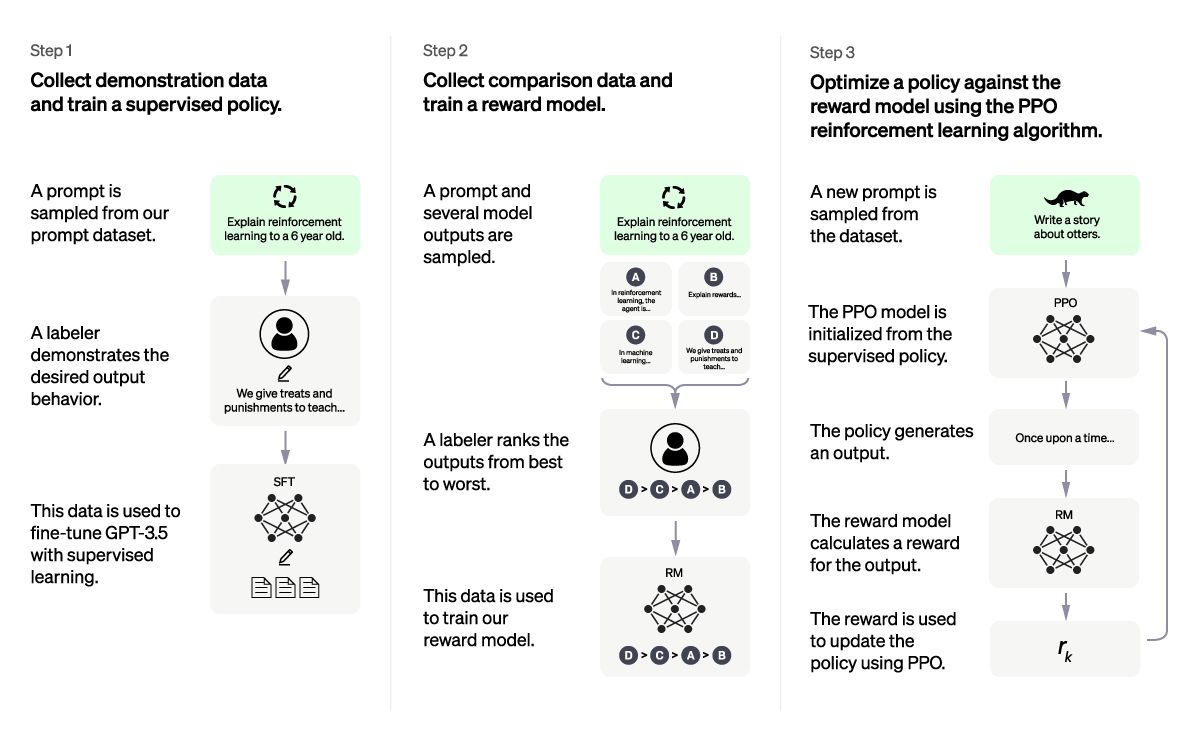
What does GPT stand for in ChatGPT?
GPT stands for Generative Pre-trained Transformer. They belong to a group of large language models (LLMs) that can create convincingly human-like text responses. The user first provides a single prompt or a series of them, and ChatGPT responds based on what it learned through being trained on large, publicly available datasets.
Let’s explore that more by breaking down each part in GPT.
-
Generative is the ability of AI to create different types of content, including text, images, audio, and data. In the case of ChatGPT, it focuses on generating text, for now.
-
Pre-trained means that the AI uses a model that is the result of being trained on a large volume of data. Generally speaking, the more data it's trained on, the better the quality of responses, though it takes longer and costs more.
-
A transformer is a type of neural network that can understand relationships between the data it has access to by breaking it down into smaller pieces that it can analyze. In the case of ChatGPT, this allows you to carry on a conversation with it and have it carry out tasks for you.
How long does ChatGPT stay at capacity?
ChatGPT can reach capacity when there’s a heavy load on its servers, caused by many users prompting it at the same time. If you’re getting the “at capacity” message, give ChatGPT a cool-down period by waiting a few minutes before trying again.
Sometimes, you might have to wait a half hour or more. You also have the option to subscribe to ChatGPT Plus if you want your requests to have priority, even during peak times.
How many questions can you ask ChatGPT in an hour?
On average, you can ask ChatGPT 60 questions in an hour. This is assuming that it takes 30 seconds to ask a question and you get the response back within 30 seconds.
Here are a few different factors that affect how many questions you can ask:
-
Prompt Quality: If your question is unclear or vague, you’ll spend extra time clarifying to ChatGPT what you’re asking it to do.
-
Question Type: A factual, straightforward question is easier for ChatGPT to answer, while an open-ended question that needs a longer response will take longer.
-
Length and Difficulty: If your question requires a series of follow-up questions or requires complex research, ChatGPT might take longer to respond.
Does ChatGPT have a word limit?
GPT-4 Turbo has the highest limit at 96,000 words. GPT-3.5 is limited to 3,000 words and ChatGPT-4 can handle up to 25,000 words.
Since ChatGPT can remember your chat history, you may be able to get around limits by splitting it into a series of questions and responses. For example, if you're asking it to write an article for you, ChatGPT could deliver it to you one section at a time.
Does ChatGPT save data?
When first released, ChatGPT always saved the responses and history of its users as a conversation thread. This makes it capable of carrying on complex conversations, completing a series of tasks, and lets you fine-tune its responses.
Recently though, OpenAI rolled out a new feature that lets you disable your chat history by changing a setting. This gives you control over what conversations OpenAI can use to train its models and more privacy.
What can GTPs do?
GTPs are custom trained versions of ChatGPT that have special abilities, extra knowledge, and unique combinations of skills. No coding is required, and they can be created by having conversations with GTP Builder.
Some examples include a GTP that's an expert at explaining board and card games, one that can create any kind of sticker art, or one that's a creative writing coach.
OpenAI is planning on launching a GTP store where users can share their creations and eventually be able to earn money.
What jobs will ChatGPT replace?
According to a working paper released by OpenAI earlier this year, certain types of jobs are more “exposed” to ChatGPT than others. They analyzed the labor market and predict that jobs like cooks, athletes, and stonemasons have the least exposure, while jobs like tax preparers, translators, and proofreaders have high exposure.
Specifically, they looked at what percentage of a job and its tasks could benefit from and have the potential to be automated partially or completely by ChatGPT.
Keep in mind that when new technology like ChatGPT reshapes industries, it has the capacity to create new jobs, either directly or indirectly.
In fact, prompt engineers are already becoming a sought-after commodity and earn up to six-figure salaries. They specialize in knowing how to communicate with and get the most out of AIs.
Wrapping up
That’s it for my roundup of ChatGPT statistics.
As I look back at 2023, I can't help but think about what ChatGPT will accomplish this year. One potential development that comes to mind is the rumored "Q" model, which may have the ability to solve math problems it has never seen before.
If OpenAI follows the same pace in training new models, we may see a GPT version this year that achieves artificial general intelligence (AGI).
If you want to stay up-to-date on all the latest ChatGPT stats, continue to check back here.